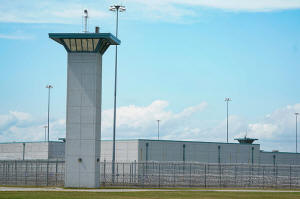Federal Bureau of Prisons moves to end union protections for its workers
[September 26, 2025]
By MICHAEL R. SISAK
The federal Bureau of Prisons said Thursday it is canceling a collective
bargaining agreement with its workers and stripping them of union
rights, the latest move by the Trump administration to gut labor
protections for federal employees.
Director William K. Marshall III told the agency's nearly 35,000
employees that the union, the Council of Prison Locals, had become “an
obstacle to progress instead of a partner in it." The contract, he said,
“too often slowed or prevented" changes meant to improve safety and
morale.
“The whole purpose of ending this contract is to make your lives
better,” Marshall wrote in a message posted to the agency's website. He
said the agency will "move forward with solutions that work, without
roadblocks, without excuses, and with one goal: to make the Bureau a
place where people are proud to serve.”
The union’s president, Brandy Moore-White, said ending the collective
bargaining agreement, which was supposed to run through May 2029, will
jeopardize the safety and livelihoods of workers who endure dangerous
conditions to keep inmates, staff and communities safe.
"We will absolutely fight this tooth and nail!” she said.
The Bureau of Prisons operates 122 facilities and has about 155,000
inmates. It has an annual budget of more than $8.5 billion. The Justice
Department's largest employer, it has been plagued for years by severe
understaffing that has led to long overtime shifts and the use of prison
nurses, teachers, cooks and other workers to guard inmates.
The agency has a $3 billion repair backlog, thousands of positions are
vacant and an official told Congress in February that more than 4,000
beds are unusable because of dangerous conditions like leaking or
failing roofs, mold, asbestos or lead.

In a letter Thursday informing Moore-White of the move, Marshall cited a
executive order that President Donald Trump signed in March that exempts
federal intelligence, counterintelligence, investigative and national
security agencies from collective bargaining or recognizing employee
labor unions.
A few weeks before Trump signed the executive order, the Department of
Homeland Security said it was ending its collective bargaining agreement
with Transportation Security Administration employees who screen
passengers and baggage at airports and other travel hubs. The union sued
and a judge issued a preliminary injunction in June that has kept the
contract in place.
Marshall told Moore-White that union dues will no longer be collected
and that employees no longer have a right to union representation during
meetings with management, investigative interviews or other proceedings.
In his message Thursday to Bureau of Prisons employees, Marshall said
that even without a union or collective bargaining pact, they will
continue to enjoy robust protections under federal civil service law,
including job security and whistleblower rights.
[to top of second column]
|

The federal prison complex in Terre Haute, Ind., is shown Aug. 28,
2020. (AP Photo/Michael Conroy, File)

Workers will not be removed, suspended or demoted without cause and
due process, he wrote. Pay and benefits, including salary,
retirement, health insurance, overtime, leave accrual and uniform
allowance are guaranteed by law and will remain unchanged.
"Those safeguards aren’t going anywhere," Marshall said. “This isn’t
about taking things away, it’s about giving you more. More clarity.
More fairness. More respect.”
The Bureau of Prisons has been in a state of flux since Trump
returned to office in January.
Its mission has been expanded under the Republican’s administration
to include taking in thousands of immigration detainees at some of
its prisons and jails under an agreement with the Department of
Homeland Security.
In May, Trump directed the Bureau of Prisons to rebuild and reopen
Alcatraz — the notorious penitentiary on an island in San Francisco
Bay that last held inmates more than 60 years ago. Four months
later, it remains a tourist attraction.
The Bureau of Prisons last year closed several facilities, in part
to cut costs, but it is also in the process of building a new prison
in Kentucky. In May, Marshall said the agency was halting some
hiring.
An ongoing Associated Press investigation has uncovered deep,
previously unreported flaws within the Bureau of Prisons, including
rampant sexual abuse, widespread criminal activity by employees,
dozens of escapes and the free flow of guns, drugs and other
contraband.
Working face to face with killers, sexual predators and other
violent criminals, federal prison employees are routinely threatened
and harassed, and some have been slashed, stabbed or even killed.
Last year, a mailroom supervisor at the U.S. Penitentiary in
Atwater, California, died after opening a letter that prosecutors
said was laced with fentanyl and other substances. At the federal
prison in Thomson, Illinois, a union official said, female staff
members were subject to more than 1,600 instances of sexual
harassment and abuse by inmates in a four-year span.
All contents © copyright 2025 Associated Press. All rights reserved
 |